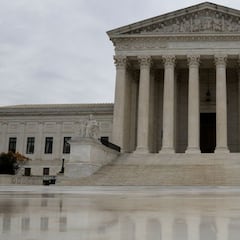What is the Supreme Court what are its justices? Whats their role? Who chose them?
The highest court in the country, the Supreme Court is the final jurisdiction on all legal matters in the United States.


Established by Article Three of the United States Constitution, the Supreme Court was initially established by the 1st Congress through the Judiciary Act of 1789. As later set by the Judiciary Act of 1869, the Court consists of the chief justice of the United States and eight associate justices: nine in total. The court has massive power, being able to effectively veto legislation and laws that it deems are against the constitution.
The Supreme Court term begins on the first Monday in October, usually lasting until July of the following year.
Related news:
- What is the Texas abortion law?
- What are the abortion laws in America?
- What does fetal heartbeat mean?
What's the role of the court?
Supreme Court justices hear oral arguments and make decisions on cases they are recommended. They are typically cases in controversy from lower appeals courts. The court receives between 7,000 and 8,000 petitions each term and hears oral arguments in about 80 cases.
Who are the justices?
Each justice has lifetime tenure, meaning they remain on the Court until they resign, retire, die, or are removed from office. When a vacancy occurs, the president, with the advice and consent of the Senate, appoints a new justice.
Currently, the nine justices are:
- John G. Roberts, recommended By President Bush
- Clarence Thomas, recommended by President Bush
- Stephen G. Breyer, recommended by President Clinton
- Samuel A. Alito, recommended by President Bush
- Sonia Sotomayor, recommended by President Obama
- Elena Kagan, recommended by President Obama
- Neil M. Gorsuch, recommended by President Trump
- Brett M. Kavanaugh, recommended by President Trump
- Amy Coney Barrett, recommended by President Trump
Justices Kavanaugh and Barrett will be key votes as the Supreme Court on Wednesday takes up Mississippi’s ban on abortion after 15 weeks of pregnancy.https://t.co/d2ackz9mPG
— Bloomberg Law (@BLaw) November 29, 2021
Is the court democratic?
An accusation levelled at the court is that it is fundamentally undemocratic.
Related stories

What is the Texas abortion law? What is the Texas abortion ban?

What are the abortion laws in America? In what states is it illegal to have an abortion?
As the nomination of justices is totally random, giving president's the power to mold one of the strongest institution in their political image. For example, despite winning the popular vote only once since 1988, the Republican Party have appointed six out of the last 10 justices. This has given the party much greater power than the Democrats to craft constitutional and federal law, despite only once having a popular mandate to do so.
On December 1st, the fate of Roe v. Wade lies with the Supreme Court. Again.
— Amy Klobuchar (@amyklobuchar) November 29, 2021
It’s time to write reproductive rights into federal law.
This isn't to say the court always kowtows the president's line. President Trump openly criticized the court for not doing his bidding by investigating his baseless claim of voter fraud in the 2020 election, in the hope that his three appointments would be loyal to him. However, the justices held their ground and pushed back against the president, affirming the court's power.